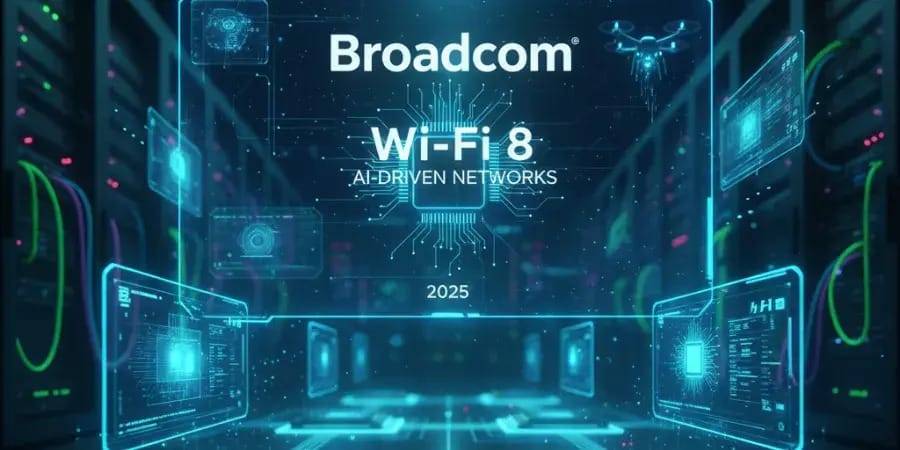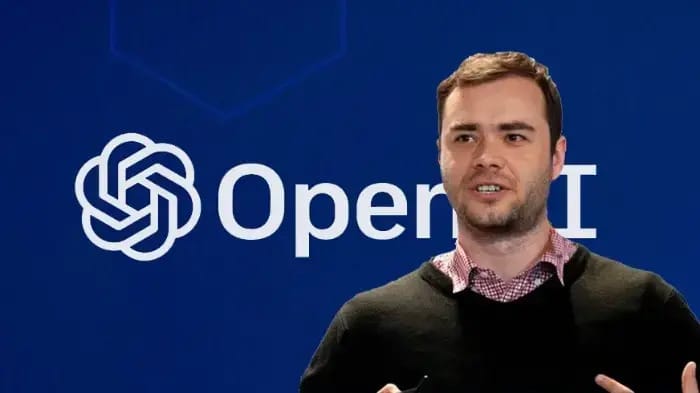- OpenTools' Newsletter
- Posts
- OpenTools: The Deviant Version 😈
OpenTools: The Deviant Version 😈
PLUS: Wi-Fi 8 changing the AI game + OpenAI's Co-Founder Admits you won't be replaced

Reading time: 5 minutes
Welcome to something different.
Look, we write the same newsletter every week. Two main stories, three snippets, rinse and repeat.
It works. You read it. We're grateful.
But this week? Our usual editor is out so we're trying something new.
Same AI news you need to know. Same breakdown structure. But with a little more edge. A little more opinion. A little more "here's what we actually think when we're not being polite.
Think of this as the newsletter version of taking off your blazer at the conference after-party.
Still professional. Still useful. Just… less buttoned up.
Let's get started.
🗞️In this edition
Wi-Fi 8 is coming (and it's built for AI)
Sponsored: Hubspot – Turn AI into Income
OpenAI co-founder says agents won't work for another decade
Workflow Wednesday #41 ‘AI & Human Creativity’
In other AI news –
Lenovo launches agentic AI capabilities claiming $4 ROI for every $1 invested
Thomson Reuters launches enhanced AI solutions for corporate tax and trade
PayRetailers debuts EON, an in-house AI platform for payments
4 must-try AI tools
❓What's happening:
Broadcom just announced the first Wi-Fi 8 silicon before the specs are even finalized. The standard won't be official until 2028, but they're shipping chips now based on draft specifications.
Here's what makes Wi-Fi 8 different.
Previous generations competed on peak speeds - Wi-Fi 6 had OFDMA, Wi-Fi 6E got 6 GHz spectrum, Wi-Fi 7 brought 320 MHz channels. Wi-Fi 8 bundles multiple technologies focused on consistent performance under challenging conditions.
The key innovation? Ultra High Reliability (UHR) architecture that targets the 99th percentile user experience rather than best-case scenarios.
Translation: everyone gets fast speeds, not just the person sitting closest to the router.
The standard introduces coordinated multi-access point features, dynamic spectrum management, and hardware-accelerated telemetry designed specifically for AI workloads at the network edge.
Why does this matter for AI specifically?
Traditional Wi-Fi optimizes for 90/10 download-to-upload ratios. AI applications push toward 50/50 symmetry - voice assistants, edge AI processing, and sensor data all require consistent uplink capacity.
The tech includes coordinated multi-AP operation (your access points actually talk to each other), dynamic spectrum access that fills unused bandwidth in real-time, and extended range features for IoT devices.
Broadcom's simulations showed 200% median throughput improvement and 6x lower latency at the 99th percentile compared to Wi-Fi 7.
🤷🏼♂️Why this is important:
AI isn't just about ChatGPT on your laptop anymore.
It's edge devices. Security cameras running computer vision. Smart home sensors. Voice assistants. All sending data upstream constantly.
Your current Wi-Fi wasn't designed for this.
Wi-Fi 8's coordinated approach prevents ping-pong roaming and maintains sub-millisecond handoff latency. Access points share client context information before handoff, eliminating re-authentication delays that cause audio drops and video freezes.
The infrastructure layer matters. If AI adoption is going to scale in homes and offices, the network needs to handle symmetric traffic without choking.
😈 Our personal take on it at OpenTools:
This is one of those "plumbing" stories that sounds boring but isn't.
Everyone's obsessed with LLMs and agents. No one's talking about the network layer that makes edge AI actually work.
Broadcom shipped chips before specs are finalized (they're working from draft 1.5). That's ballsy. It's also a signal that they see AI workloads as THE use case that justifies Wi-Fi 8's existence.
The timing matters too. 2028 finalization means widespread adoption by 2030-2031.
That's the exact window when AI agents are supposed to mature (more on that in Story 2).
If Karpathy's right that agents need a decade, the infrastructure will be ready right when the software catches up.
Coincidence? Maybe. Or maybe Broadcom's betting on a world where every device in your home is running local AI.
Either way, "Wi-Fi 8 makes AI faster" undersells it.
It's more like: "Wi-Fi 8 was designed from scratch assuming AI is everywhere."
How can AI power your income?
Ready to transform artificial intelligence from a buzzword into your personal revenue generator
HubSpot’s groundbreaking guide "200+ AI-Powered Income Ideas" is your gateway to financial innovation in the digital age.
Inside you'll discover:
A curated collection of 200+ profitable opportunities spanning content creation, e-commerce, gaming, and emerging digital markets—each vetted for real-world potential
Step-by-step implementation guides designed for beginners, making AI accessible regardless of your technical background
Cutting-edge strategies aligned with current market trends, ensuring your ventures stay ahead of the curve
Download your guide today and unlock a future where artificial intelligence powers your success. Your next income stream is waiting.
Do you like the new OpenTools Newsletter Format? |
What's happening:
Andrej Karpathy, OpenAI co-founder, went on the Dwarkesh Podcast and said it's not the "year of agents" - and while he uses AI agent tools like Claude and Codex, they're still way behind human work.
His exact words: "They're cognitively lacking and it's just not working. It will take about a decade to work through all of those issues."
"They just don't work. They don't have enough intelligence, they're not multimodal enough, they can't do computer use and all this stuff. They don't have continual learning. You can't just tell them something and they'll remember it."
This is important context: Karpathy isn't some skeptic. He co-founded OpenAI. He's pro-AI. And he's saying agents are broken.
Meanwhile, the market's already pulling back.
50% of organizations who expected to significantly reduce their customer service workforce by 2027 are now abandoning these plans, according to Gartner. And 95% of firms who have implemented AI pilots have flopped.
Some companies are still pushing forward. McKinsey built an AI agent using Microsoft's Copilot Studio that monitors an email address for incoming project proposals. While a human must check what the agent produces, it cut project review time from 20 days to two.
But that's assisted automation, not autonomy.
Why this is important:
Because half the AI hype cycle right now is built on agents.
Every VC pitch deck has "AI agents" in it. Every enterprise software company is adding "agentic workflows." The assumption is that by 2026-2027, agents will be doing real work unsupervised.
Karpathy - who actually builds this stuff - is saying: not even close.
A decade means 2035 before agents are genuinely autonomous.
That's a long time to wait if you're a startup burning cash or an enterprise that just bought a $500K agent platform.
Karpathy compared them to "an employee or an intern that you would hire to work with you." But interns can learn. Current agents can't retain information across sessions.
The gap isn't small. It's architectural.
Our personal take on it at OpenTools:
This is the most honest take we've heard from someone actually building frontier AI.
Not "agents will replace jobs" or "agents are the future of work."
Just: they don't work yet. And it's going to take a while.
Here's what's wild though.
Karpathy's timeline (10 years) perfectly aligns with when Wi-Fi 8 will be widely deployed.
That's not a coincidence. The hardware and software need to evolve together.
Right now, agents fail because they're not smart enough. But even if they were smarter, they'd fail because the infrastructure can't handle the symmetric, low-latency traffic they'd generate.
The real story isn't "agents are overhyped" (though they are).
It's that we're in the infrastructure buildout phase.
The boring stuff - Wi-Fi standards, data centers, edge computing - that's what's being built right now. The agents will come later.
Karpathy posted on X that he wants AI to "make fewer assumptions and ask/collaborate with me when not sure about something. I want to learn along the way and become better as a programmer, not just get served mountains of code that I'm told works."
That's the mindset shift.
Agents aren't replacing humans in the next decade. They're collaborative tools that make humans better.
The companies building for that reality - augmentation, not replacement - are the ones to watch.
The ones promising full automation by 2027? They're selling a product that doesn't exist yet.
And won't for a long time.
This Week in Workflow Wednesday #41: AI & Human Creativity
Workflow #1: From Creative Thoughts to Instagram Post with Canva AI (free).
Step 1: Head to Canva AI → Text-to-Image. Type the idea you’ve been sitting on.
Step 2: Generate 4–5 variations. Go back into the Canva AI and insert the prompt…….we explore this and 2 more workflows inside this week’s edition of Workflow Wednesday.
Lenovo launches agentic AI capabilities claiming $4 ROI for every $1 invested – Lenovo's betting big on "AI-enabled workforce" with new agentic features across AI PCs and services, claiming customers are cutting support tickets by 30%. Classic enterprise play: their own research shows 60% of IT leaders aren't ready to manage AI agent threats, so naturally they're selling the solution.
Thomson Reuters launches enhanced AI solutions for corporate tax and trade – Thomson Reuters rolled out AI-native tax apps that automate advisory and compliance workflows, claiming professionals will save 240 hours annually. They're going vertical-specific while everyone else does generic GenAI wrappers.
PayRetailers debuts EON, an in-house AI platform for payments – PayRetailers launched EON, their in-house AI platform for payments with natural language search and automated ticket handling. Building in-house instead of using third-party tools gives them control over their data – which in payments, is everything.
Avian.io - A data automation platform for marketing data, integrating seamlessly with Google Sheets, Looker Studio, or Data Warehouses
Prompt Storm - Google Chrome extension with pre-written prompts for ChatGPT, Gemini, Claude
Pictory - Converts your long form content such as text scripts or articles into highly-engaging branded videos with stock footage
Careered - An online platform that helps users creates cover letters from resumes and job listings
That's the deviant version.
Same news. Less polish. More opinion.
– The OpenTools Team
P.S. Let me know what you think about this edition - no hard feelings
How did we like this version? |
Interested in featuring your services with us? Email us at [email protected] |



